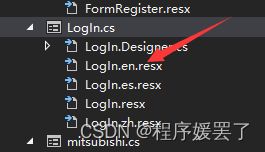C#实现多语言切换
代码:https://github.com/tangbb1/C-shop/tree/master
思路描述:
①窗体的language属性修改为自己需要设定语言 localizable属性改为true。在窗体上进行英文编辑,即可生成对应的资源文件

②根据组件名称读取资源文件内容

③其中除窗口对应的字段之外,还有类似MessageBox的固定字段,及代码中默认设定值。须在资源文件中自定义该类字段

使用代码读取:
public static ResourceManager res = new ResourceManager(typeof(nonUIresx)); //自定义资源字段
res.GetString(“saveFault”)
![]()
注:主要代码如下:(设置默认语言;遍历组件;重写messagebox;
using DevExpress.XtraBars;
using DevExpress.XtraBars.Ribbon;
using System;
using System.Collections.Generic;
using System.Drawing;
using System.Linq;
using System.Runtime.InteropServices;
using System.Text;
using System.Threading.Tasks;
using System.Windows.Forms;
namespace BingSolhalcon
{
class MultiLanguage
{
//当前默认语言
public static string DefaultLanguage = "zh";
///